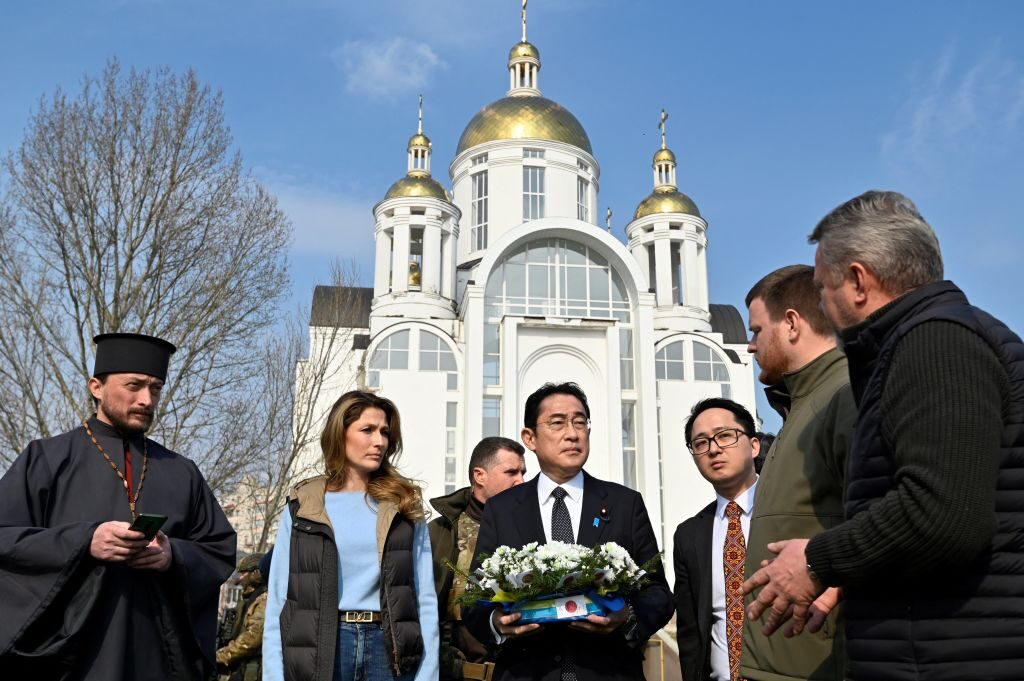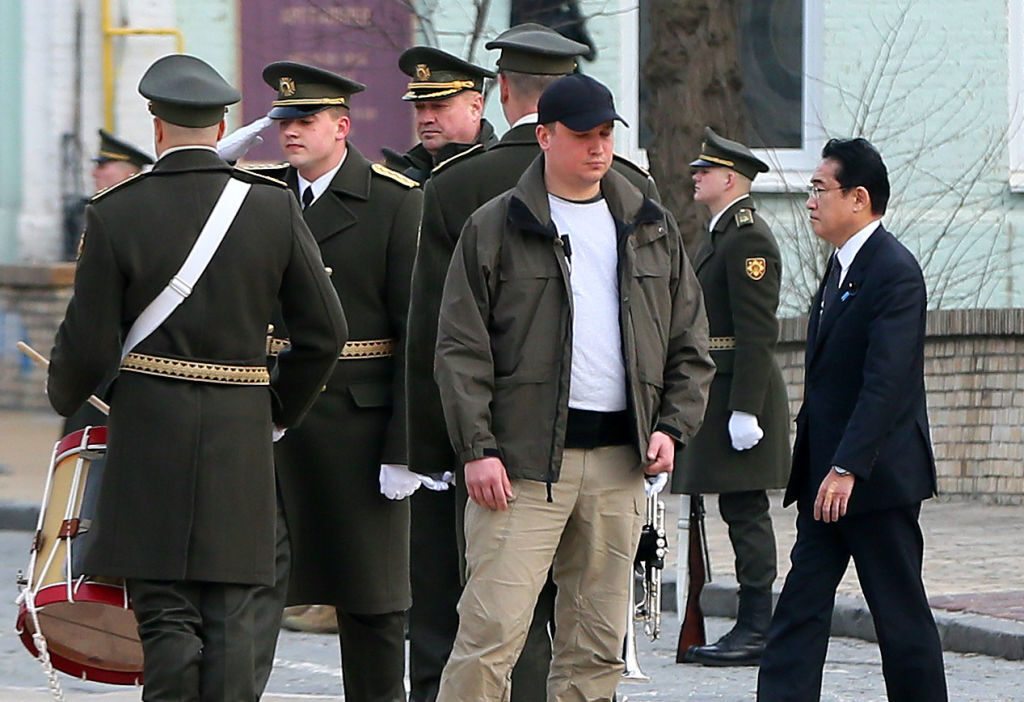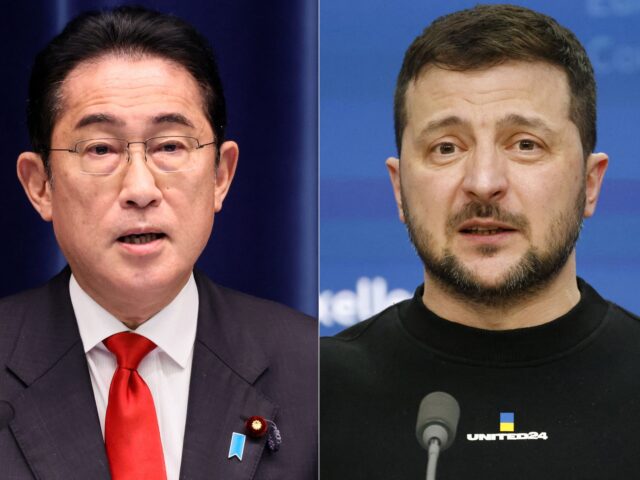Japanese Prime Minister Kishida Fumio made a surprise visit to Ukraine’s capital city of Kyiv on Tuesday for talks with President Volodymyr Zelensky.
Russia flew two nuclear-capable strategic bombers over the Sea of Japan on Tuesday in an apparent gesture of disapproval.
Kishida’s trip was kept secret until the last minute when Japanese state television surprised audiences by showing the prime minister boarding a train in Poland to cross the Ukrainian border.
“It is rare for a Japanese leader to make an unannounced trip to a foreign nation,” Japan’s Kyodo News noted. It is normally necessary for the Japanese parliament, the Diet, to review and approve ministerial-level trips outside the country but, in this case, the Diet waived that requirement out of concern for Kishida’s safety.
Besides being unannounced, Kishida’s visit was significant for several reasons: Japan is the current holder of the rotating Group of Seven (G7) presidency; Kishida went to Ukraine immediately after meeting with Narendra Modi, president of India, an ally of the G7 and perhaps an aspirant to membership; and Kishida arrived in Kyiv while Chinese dictator Xi Jinping was visiting his ally Vladimir Putin in Moscow.

Japan’s Prime Minister Fumio Kishida (C) visits the site of a mass grave found on the grounds of the church of Saint Andrew Pervozvannoho All Saints in the town of Bucha, during his visit to Ukraine on March 21, 2023, amid the Russian invasion of Ukraine. (SERGEI CHUZAVKOV/AFP via Getty)
Kishida’s visit, therefore, signaled a solidifying free-world alliance against the rising Chinese-Russian axis of tyranny. He invited Modi to attend the next G7 summit while in Delhi, and Modi responded by noting that since India currently chairs the G20, both of those important groups are headed by representatives of the “Global South.”
The Global South is India’s vision of developing nations emerging from the geopolitical constraints of the Cold War to chart their own course as a bloc of independent powers, led by huge India and advanced Japan. India sees the Global South emerging from the shadow of Western powers while remaining allied with them to counter the growing threat of China.
Japan and India are also both members of the Quadrilateral Security Dialogue, commonly known as “the Quad,” an Indo-Pacific security alliance that also includes the United States and Australia.
U.S. Ambassador to Japan Rahm Emanuel played up the contrast between Kishida visiting Ukraine and Xi visiting Russia in a statement on Tuesday:
Today, the news tells of two very different European-Pacific partnerships. Prime Minister Kishida is making an historic visit to Ukraine to protect the Ukrainian people and promote the universal values enshrined in the U.N. Charter.
Approximately 900 kilometers away, a different and more nefarious partnership is taking shape in Moscow, where Xi Jinping is visiting to protect Vladimir Putin from the International Criminal Court and pardon him from international public opinion against this war.
Among these two Pacific leaders visiting Europe, Prime Minister Kishida stands with freedom, and Xi stands with a war criminal. Which Pacific leader is the right partner for a brighter future?
Emanuel was referring to the International Criminal Court (ICC) arrest warrant issued for Putin on Friday to face war crimes charges for kidnapping Ukrainian children and bringing them to Russia.
Kishida said in India that Russia’s invasion of Ukraine, with China’s initially tacit approval and now increasingly active support, was part of a “paradigm shift” that began with the Wuhan coronavirus pandemic.
These events have convinced Japanese leaders they cannot afford to be so completely reliant on other countries for vital needs, from food to military assistance, and they are clearly nervous that if Russia takes Ukraine by force, China will be emboldened to make its own aggressive moves against the South China Sea region and Taiwan.
Japan has tensions with Russia that are separate from its concerns about the Chinese-led axis of tyranny. Japan and Russia have ongoing territorial disputes that have prevented them from formally concluding World War II for almost 80 years, just as Japan vigorously disputes China’s claims on the Senkaku Islands in the South China Sea. Tokyo has reason to fear those disputes might be settled in tandem by the Xi-Putin partnership after a victory in Ukraine.
“In the international community, a big balance of power change is occurring,” he said, alluding to China’s growing power and the waning of U.S. influence in the Indo-Pacific region.
The Japanese Foreign Ministry said Kishida went to Kyiv at Zelensky’s invitation to “show respect to the courage and patience of the Ukrainian people who are standing up to defend their homeland under President Zelenskyy’s leadership and show solidarity and unwavering support for Ukraine as head of Japan and chairman of G-7.”

Japan’s Prime Minister Fumio Kishida attends the ceremony of laying flowers at the Wall of memory of the fallen Ukrainian soldiers in Kyiv, Ukraine, on March 21, 2023. (Photo by Vladimir Shtanko/Anadolu Agency via Getty)
Kishida told Ukrainian officials that he wanted to “provide maximum support in order to restore peace in Ukraine,” a clear notice to Xi and Putin that other voices would be heard at the negotiating table.
Japan has given over $7 billion in support to Ukraine since the beginning of the war, and it has taken in over 2,000 Ukrainian refugees, a very unusual move for the Japanese.
Kishida pointedly visited Bucha, a town near Kyiv that witnessed some of the worst Russian atrocities of the war. He laid flowers at a church in Bucha and said he was “outraged by the cruelty” Russian forces displayed toward its residents.
Chinese Foreign Ministry spokesman Wang Wenbin sputtered on Tuesday that Kishida should “do more things that can help de-escalate the situation, not otherwise.”
“The international community needs to stick to the right path of promoting peace talks and create conditions for the political settlement of the Ukraine crisis,” he said, a grimly amusing bit of hypocrisy given Chinese leader Xi Jinping is currently holding warm and cozy meetings with his “dear friend” Vladimir Putin, the man who launched the invasion of Ukraine, and could end it tomorrow.

COMMENTS
Please let us know if you're having issues with commenting.